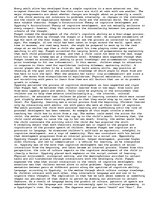Every adult alive has developed from a simple cognitive to a more advanced one, but accepted theories that explain how this occurs are still at odds with one another. The major disagreements are about whether changes are brought about as primarily a result of the child working out solutions to problems internally, or changes in the individual are the result of negotiations between the child and the external world. Two of the more notable theories, Piaget's Constructivist Theory of cognitive development and Vygotsky's Sociocultural Theory of cognitive development, are not mutually exclusive in every respect; however, they do characterize the dissimilarity between two prominent schools of the thought.
Piaget viewed the development of the child's cognitive ability as a four-stage process. Children would move up through the stages in a fixed order. He assigned estimations of age for each of the four stages, but did not see the process as connected to specific ages. For example, if one child had been taken on trips around the world, spent much time in museums, and read many books, she might be prepared to move up to the next stage at an earlier age than a child who spent his time playing video games and watching tv all day. …


